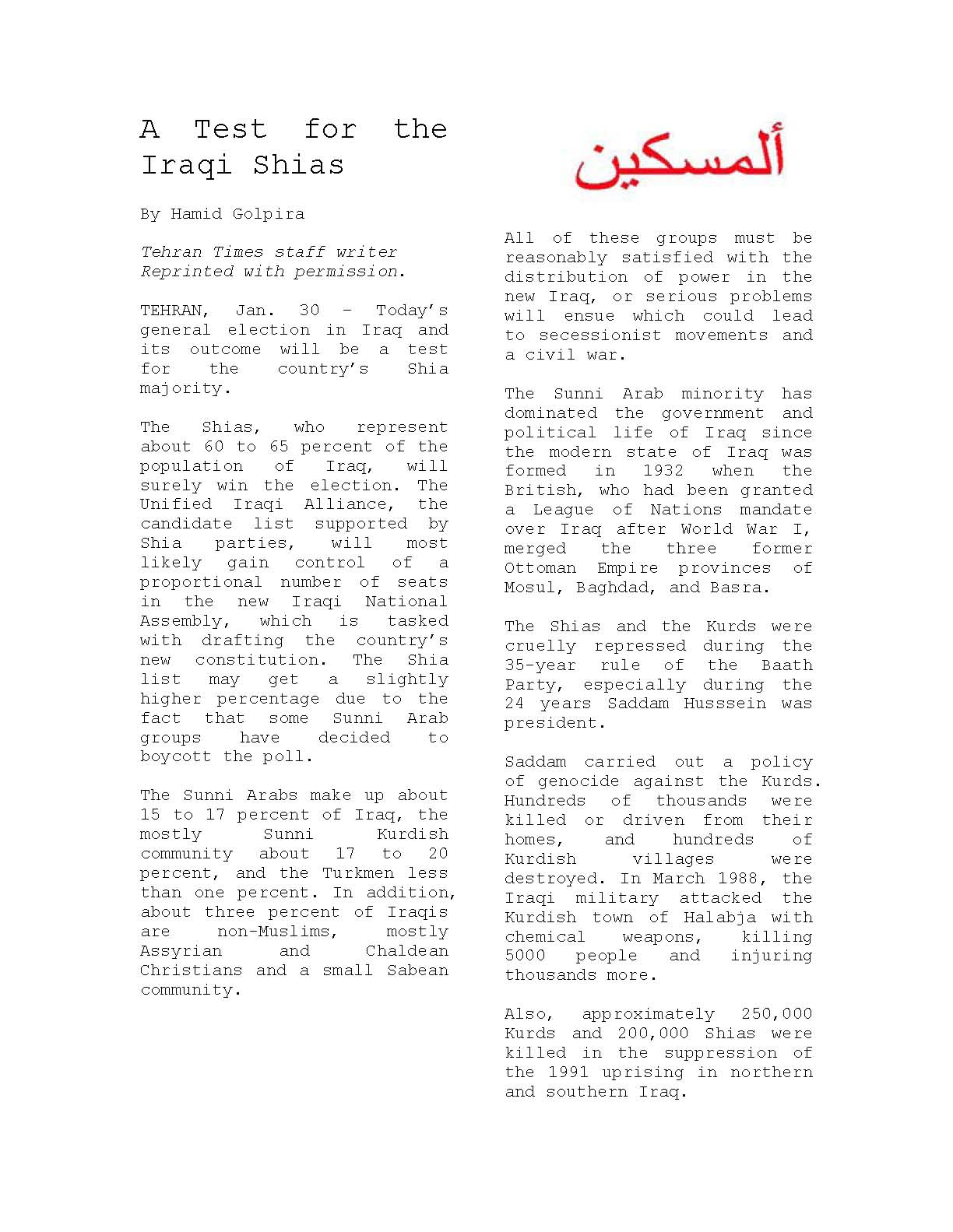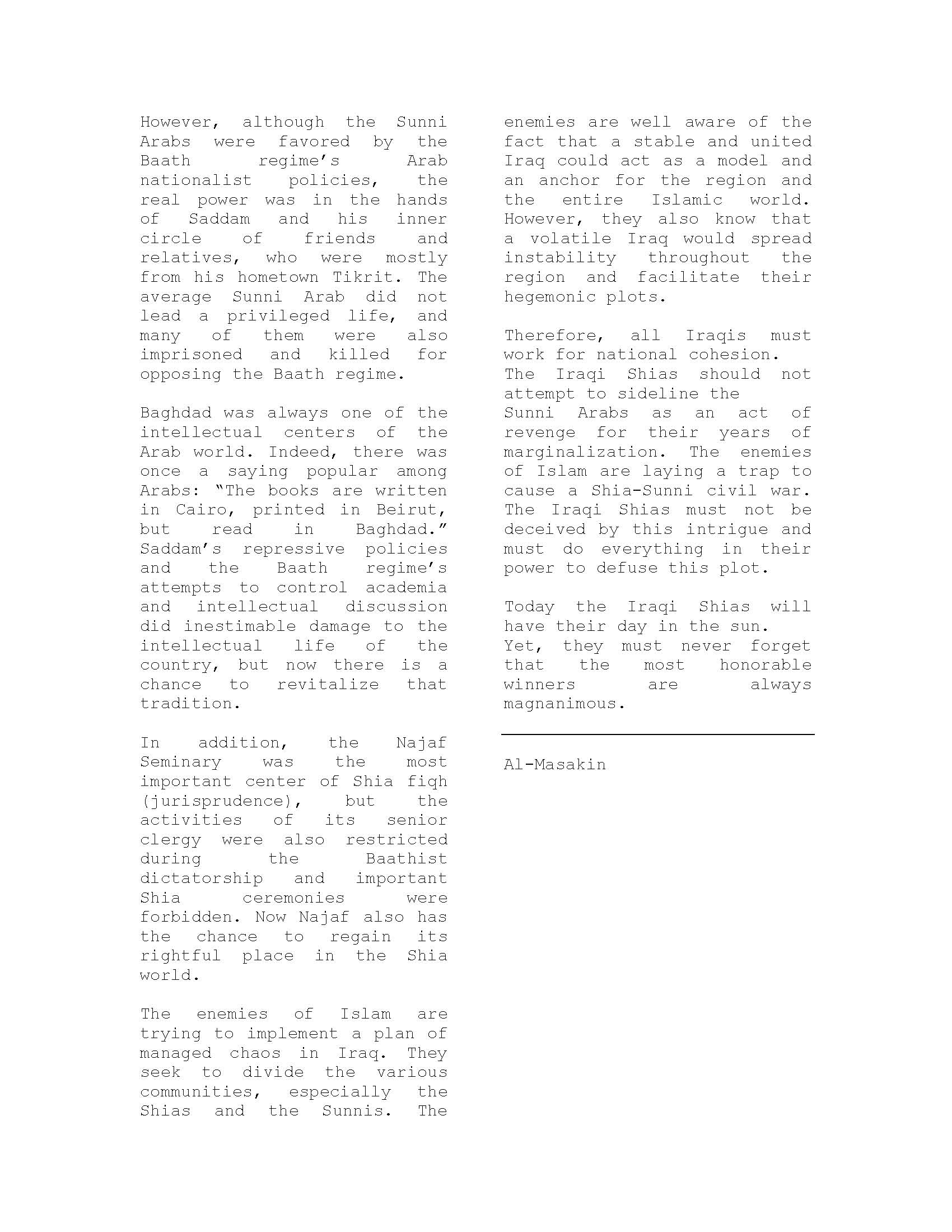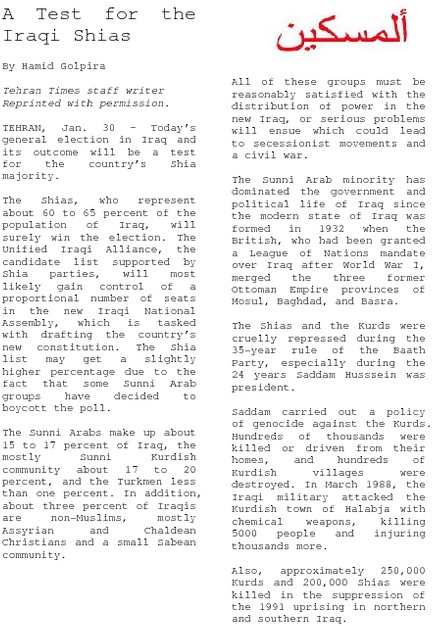From the Open-Publishing Calendar
From the Open-Publishing Newswire
Indybay Feature
A Test for the Iraqi Shias
By Hamid Golpira
Tehran Times staff writer
Reprinted with permission.
TEHRAN, Jan. 30 – Today’s general election in Iraq and its outcome will be a test for the country’s Shia majority.
Tehran Times staff writer
Reprinted with permission.
TEHRAN, Jan. 30 – Today’s general election in Iraq and its outcome will be a test for the country’s Shia majority.

The Shias, who represent about 60 to 65 percent of the population of Iraq, will surely win the election. The Unified Iraqi Alliance, the candidate list supported by Shia parties, will most likely gain control of a proportional number of seats in the new Iraqi National Assembly, which is tasked with drafting the country’s new constitution. The Shia list may get a slightly higher percentage due to the fact that some Sunni Arab groups have decided to boycott the poll.
The Sunni Arabs make up about 15 to 17 percent of Iraq, the mostly Sunni Kurdish community about 17 to 20 percent, and the Turkmen less than one percent. In addition, about three percent of Iraqis are non-Muslims, mostly Assyrian and Chaldean Christians and a small Sabean community.
All of these groups must be reasonably satisfied with the distribution of power in the new Iraq, or serious problems will ensue which could lead to secessionist movements and a civil war.
The Sunni Arab minority has dominated the government and political life of Iraq since the modern state of Iraq was formed in 1932 when the British, who had been granted a League of Nations mandate over Iraq after World War I, merged the three former Ottoman Empire provinces of Mosul, Baghdad, and Basra.
The Shias and the Kurds were cruelly repressed during the 35-year rule of the Baath Party, especially during the 24 years Saddam Husssein was president.
Saddam carried out a policy of genocide against the Kurds. Hundreds of thousands were killed or driven from their homes, and hundreds of Kurdish villages were destroyed. In March 1988, the Iraqi military attacked the Kurdish town of Halabja with chemical weapons, killing 5000 people and injuring thousands more.
Also, approximately 250,000 Kurds and 200,000 Shias were killed in the suppression of the 1991 uprising in northern and southern Iraq.
However, although the Sunni Arabs were favored by the Baath regime’s Arab nationalist policies, the real power was in the hands of Saddam and his inner circle of friends and relatives, who were mostly from his hometown Tikrit. The average Sunni Arab did not lead a privileged life, and many of them were also imprisoned and killed for opposing the Baath regime.
Baghdad was always one of the intellectual centers of the Arab world. Indeed, there was once a saying popular among Arabs: “The books are written in Cairo, printed in Beirut, but read in Baghdad.” Saddam’s repressive policies and the Baath regime’s attempts to control academia and intellectual discussion did inestimable damage to the intellectual life of the country, but now there is a chance to revitalize that tradition.
In addition, the Najaf Seminary was the most important center of Shia fiqh (jurisprudence), but the activities of its senior clergy were also restricted during the Baathist dictatorship and important Shia ceremonies were forbidden. Now Najaf also has the chance to regain its rightful place in the Shia world.
The enemies of Islam are trying to implement a plan of managed chaos in Iraq. They seek to divide the various communities, especially the Shias and the Sunnis. The enemies are well aware of the fact that a stable and united Iraq could act as a model and an anchor for the region and the entire Islamic world. However, they also know that a volatile Iraq would spread instability throughout the region and facilitate their hegemonic plots.
Therefore, all Iraqis must work for national cohesion.
The Iraqi Shias should not attempt to sideline the
Sunni Arabs as an act of revenge for their years of marginalization. The enemies of Islam are laying a trap to cause a Shia-Sunni civil war. The Iraqi Shias must not be deceived by this intrigue and must do everything in their power to defuse this plot.
Today the Iraqi Shias will have their day in the sun.
Yet, they must never forget that the most honorable winners are always magnanimous.
-----------------------------------------
Al-Masakin
The Sunni Arabs make up about 15 to 17 percent of Iraq, the mostly Sunni Kurdish community about 17 to 20 percent, and the Turkmen less than one percent. In addition, about three percent of Iraqis are non-Muslims, mostly Assyrian and Chaldean Christians and a small Sabean community.
All of these groups must be reasonably satisfied with the distribution of power in the new Iraq, or serious problems will ensue which could lead to secessionist movements and a civil war.
The Sunni Arab minority has dominated the government and political life of Iraq since the modern state of Iraq was formed in 1932 when the British, who had been granted a League of Nations mandate over Iraq after World War I, merged the three former Ottoman Empire provinces of Mosul, Baghdad, and Basra.
The Shias and the Kurds were cruelly repressed during the 35-year rule of the Baath Party, especially during the 24 years Saddam Husssein was president.
Saddam carried out a policy of genocide against the Kurds. Hundreds of thousands were killed or driven from their homes, and hundreds of Kurdish villages were destroyed. In March 1988, the Iraqi military attacked the Kurdish town of Halabja with chemical weapons, killing 5000 people and injuring thousands more.
Also, approximately 250,000 Kurds and 200,000 Shias were killed in the suppression of the 1991 uprising in northern and southern Iraq.
However, although the Sunni Arabs were favored by the Baath regime’s Arab nationalist policies, the real power was in the hands of Saddam and his inner circle of friends and relatives, who were mostly from his hometown Tikrit. The average Sunni Arab did not lead a privileged life, and many of them were also imprisoned and killed for opposing the Baath regime.
Baghdad was always one of the intellectual centers of the Arab world. Indeed, there was once a saying popular among Arabs: “The books are written in Cairo, printed in Beirut, but read in Baghdad.” Saddam’s repressive policies and the Baath regime’s attempts to control academia and intellectual discussion did inestimable damage to the intellectual life of the country, but now there is a chance to revitalize that tradition.
In addition, the Najaf Seminary was the most important center of Shia fiqh (jurisprudence), but the activities of its senior clergy were also restricted during the Baathist dictatorship and important Shia ceremonies were forbidden. Now Najaf also has the chance to regain its rightful place in the Shia world.
The enemies of Islam are trying to implement a plan of managed chaos in Iraq. They seek to divide the various communities, especially the Shias and the Sunnis. The enemies are well aware of the fact that a stable and united Iraq could act as a model and an anchor for the region and the entire Islamic world. However, they also know that a volatile Iraq would spread instability throughout the region and facilitate their hegemonic plots.
Therefore, all Iraqis must work for national cohesion.
The Iraqi Shias should not attempt to sideline the
Sunni Arabs as an act of revenge for their years of marginalization. The enemies of Islam are laying a trap to cause a Shia-Sunni civil war. The Iraqi Shias must not be deceived by this intrigue and must do everything in their power to defuse this plot.
Today the Iraqi Shias will have their day in the sun.
Yet, they must never forget that the most honorable winners are always magnanimous.
-----------------------------------------
Al-Masakin

Add Your Comments
We are 100% volunteer and depend on your participation to sustain our efforts!
Get Involved
If you'd like to help with maintaining or developing the website, contact us.
Publish
Publish your stories and upcoming events on Indybay.
Topics
More
Search Indybay's Archives
Advanced Search
►
▼
IMC Network



